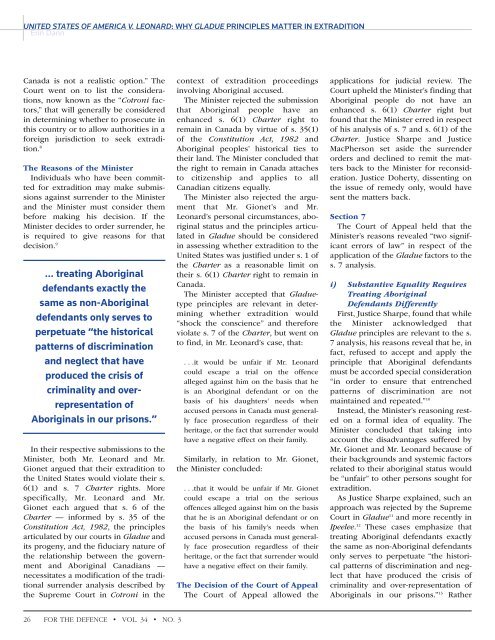FTD_Vol34_No3_web
FTD_Vol34_No3_web
FTD_Vol34_No3_web
You also want an ePaper? Increase the reach of your titles
YUMPU automatically turns print PDFs into web optimized ePapers that Google loves.
For the Defence_34-3_Layout 1 13-08-16 10:41 AM Page 26<br />
UNITED STATES OF AMERICA V. LEONARD: WHY GLADUE PRINCIPLES MATTER IN EXTRADITION<br />
Canada is not a realistic option.” The<br />
Court went on to list the considerations,<br />
now known as the “Cotroni factors,”<br />
that will generally be considered<br />
in determining whether to prosecute in<br />
this country or to allow authorities in a<br />
foreign jurisdiction to seek extradition.<br />
8<br />
The Reasons of the Minister<br />
Individuals who have been committed<br />
for extradition may make submissions<br />
against surrender to the Minister<br />
and the Minister must consider them<br />
before making his decision. If the<br />
Minister decides to order surrender, he<br />
is required to give reasons for that<br />
decision. 9<br />
... treating Aboriginal<br />
defendants exactly the<br />
same as non-Aboriginal<br />
defendants only serves to<br />
perpetuate “the historical<br />
patterns of discrimination<br />
and neglect that have<br />
produced the crisis of<br />
criminality and overrepresentation<br />
of<br />
Aboriginals in our prisons.”<br />
In their respective submissions to the<br />
Minister, both Mr. Leonard and Mr.<br />
Gionet argued that their extradition to<br />
the United States would violate their s.<br />
6(1) and s. 7 Charter rights. More<br />
specifically, Mr. Leonard and Mr.<br />
Gionet each argued that s. 6 of the<br />
Charter — informed by s. 35 of the<br />
Constitution Act, 1982, the principles<br />
articulated by our courts in Gladue and<br />
its progeny, and the fiduciary nature of<br />
the relationship between the government<br />
and Aboriginal Canadians —<br />
necessitates a modification of the traditional<br />
surrender analysis described by<br />
the Supreme Court in Cotroni in the<br />
context of extradition proceedings<br />
involving Aboriginal accused.<br />
The Minister rejected the submission<br />
that Aboriginal people have an<br />
enhanced s. 6(1) Charter right to<br />
remain in Canada by virtue of s. 35(1)<br />
of the Constitution Act, 1982 and<br />
Aboriginal peoples’ historical ties to<br />
their land. The Minister concluded that<br />
the right to remain in Canada attaches<br />
to citizenship and applies to all<br />
Canadian citizens equally.<br />
The Minister also rejected the argument<br />
that Mr. Gionet’s and Mr.<br />
Leonard’s personal circumstances, aboriginal<br />
status and the principles articulated<br />
in Gladue should be considered<br />
in assessing whether extradition to the<br />
United States was justified under s. 1 of<br />
the Charter as a reasonable limit on<br />
their s. 6(1) Charter right to remain in<br />
Canada.<br />
The Minister accepted that Gladuetype<br />
principles are relevant in determining<br />
whether extradition would<br />
“shock the conscience” and therefore<br />
violate s. 7 of the Charter, but went on<br />
to find, in Mr. Leonard’s case, that:<br />
...it would be unfair if Mr. Leonard<br />
could escape a trial on the offence<br />
alleged against him on the basis that he<br />
is an Aboriginal defendant or on the<br />
basis of his daughters’ needs when<br />
accused persons in Canada must generally<br />
face prosecution regardless of their<br />
heritage, or the fact that surrender would<br />
have a negative effect on their family.<br />
Similarly, in relation to Mr. Gionet,<br />
the Minister concluded:<br />
...that it would be unfair if Mr. Gionet<br />
could escape a trial on the serious<br />
offences alleged against him on the basis<br />
that he is an Aboriginal defendant or on<br />
the basis of his family’s needs when<br />
accused persons in Canada must generally<br />
face prosecution regardless of their<br />
heritage, or the fact that surrender would<br />
have a negative effect on their family.<br />
The Decision of the Court of Appeal<br />
The Court of Appeal allowed the<br />
applications for judicial review. The<br />
Court upheld the Minister’s finding that<br />
Aboriginal people do not have an<br />
enhanced s. 6(1) Charter right but<br />
found that the Minister erred in respect<br />
of his analysis of s. 7 and s. 6(1) of the<br />
Charter. Justice Sharpe and Justice<br />
MacPherson set aside the surrender<br />
orders and declined to remit the matters<br />
back to the Minister for reconsideration.<br />
Justice Doherty, dissenting on<br />
the issue of remedy only, would have<br />
sent the matters back.<br />
Section 7<br />
The Court of Appeal held that the<br />
Minister’s reasons revealed “two significant<br />
errors of law” in respect of the<br />
application of the Gladue factors to the<br />
s. 7 analysis.<br />
i) Substantive Equality Requires<br />
Treating Aboriginal<br />
Defendants Differently<br />
First, Justice Sharpe, found that while<br />
the Minister acknowledged that<br />
Gladue principles are relevant to the s.<br />
7 analysis, his reasons reveal that he, in<br />
fact, refused to accept and apply the<br />
principle that Aboriginal defendants<br />
must be accorded special consideration<br />
“in order to ensure that entrenched<br />
patterns of discrimination are not<br />
maintained and repeated.” 10<br />
Instead, the Minister’s reasoning rested<br />
on a formal idea of equality. The<br />
Minister concluded that taking into<br />
account the disadvantages suffered by<br />
Mr. Gionet and Mr. Leonard because of<br />
their backgrounds and systemic factors<br />
related to their aboriginal status would<br />
be “unfair” to other persons sought for<br />
extradition.<br />
As Justice Sharpe explained, such an<br />
approach was rejected by the Supreme<br />
Court in Gladue 11 and more recently in<br />
Ipeelee. 12 These cases emphasize that<br />
treating Aboriginal defendants exactly<br />
the same as non-Aboriginal defendants<br />
only serves to perpetuate “the historical<br />
patterns of discrimination and neglect<br />
that have produced the crisis of<br />
criminality and over-representation of<br />
Aboriginals in our prisons.” 13 Rather<br />
26<br />
FOR THE DEFENCE • VOL. 34 • NO. 3



